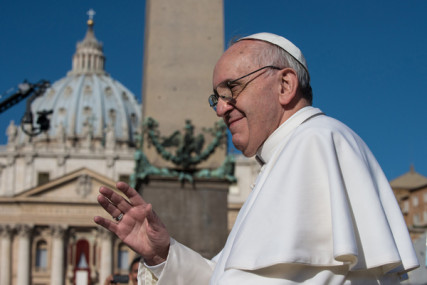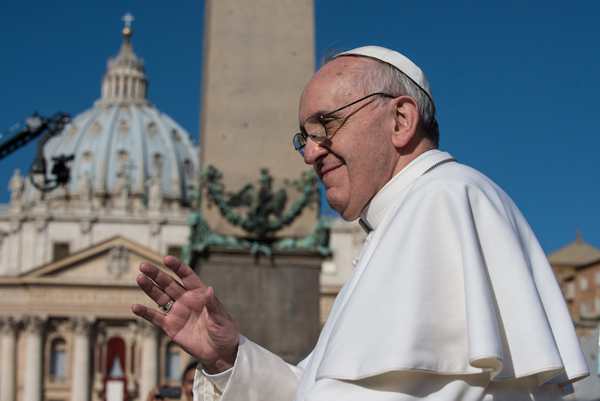
Pope Francis waves from the pope-mobile during his inauguration Mass at St. Peter’s Square on Tuesday (March 19) at the Vatican. RNS photo by Andrea Sabbadini
America magazine published an interview with Pope Francis this morning. A friend who knew it was forthcoming emailed me a few minutes beforehand, warning, “You’ll sh*t your pants.” Instead, I nearly cried.
Here’s why:
A person once asked me, in a provocative manner, if I approved of homosexuality. I replied with another question: ‘Tell me: when God looks at a gay person, does he endorse the existence of this person with love, or reject and condemn this person?’ We must always consider the person. Here we enter into the mystery of the human being. In life, God accompanies persons, and we must accompany them, starting from their situation. It is necessary to accompany them with mercy.
As a Catholic, who happens to work in the church, and who writes extensively about the church, and who is also gay, I am fairly desensitized to the veiled bigotry employed by so many Catholic leaders. Sure, the cardinals and bishops who seem obsessed with issues of homosexuality usually begin their statements recalling the Catechism of the Catholic Church that reminds us all people are to be treated with dignity. But in the next breath, their words turn to sin, disorder, unnaturalness, and general judgment and condemnation. Under Pope Benedict XVI, combined with rapid advancements for LGBT people in the West, the church’s attitude and language toward gay people reached a nadir.
With Francis, even early, we sensed something had changed.
We learned quickly that he had supported same-sex civil unions while archbishop of Buenos Aires. Early in his pontificate, I told friends and family that it was truly remarkable he hadn’t mentioned the church’s well-known opposition to same-sex marriage. If this omission alone continued, I thought, it would be progress.
Then, on a plane ride back from World Youth Day in Buenos Aires, Francis, when asked about gay priests, said simply, “Who am I to judge?” Who am I to judge? You’re the pope! My heart swelled.
His comments attracted the attention of secular media, and bishops and Catholics of a certain inclination walked them back, rejected them, explained them away. One prominent archbishop even attributed the comments to the pope being on a high from the excitement in Buenos Aires.
But in this interview, the pope gently chastises those who would diminish his mercy:
During the return flight from Rio de Janeiro I said that if a homosexual person is of good will and is in search of God, I am no one to judge. By saying this, I said what the catechism says. Religion has the right to express its opinion in the service of the people, but God in creation has set us free: it is not possible to interfere spiritually in the life of a person.
At first, I found it odd, though admittedly pleasing, how the secular media covered Pope Francis with such obvious admiration. Reddit and BuzzFeed both featured the pope, often in a positive light, unusual for sites geared toward younger, agnostic-ish crowds. NPR and the New York Times were reporting on what the bishop of Rome had to say the economy, peace, and other issues of importance on a regular basis. MSNBC suggested he was the best pope ever. Even John Stewart couldn’t help but be moved.
But at second glance, it’s all so obvious. Pope Francis is so revolutionary, so engrossing, because he is living out Gospel values of love, mercy, and compassion. These values are often antithetical to those of the world, so it moves us when people in power embody them.
People sometimes ask how I can remain in the church when it’s so hostile to gay people. I explain that the church is simply an instrument I use to understand and attempt to live out the Gospel. Pope Francis recognizes this. The Gospel is so much bigger than we often give it credit for, which is why Francis rejects those who would reduce it to a few hot-button social issues:
We cannot insist only on issues related to abortion, gay marriage and the use of contraceptive methods. This is not possible. I have not spoken much about these things, and I was reprimanded for that. But when we speak about these issues, we have to talk about them in a context. The teaching of the church, for that matter, is clear and I am a son of the church, but it is not necessary to talk about these issues all the time.
The dogmatic and moral teachings of the church are not all equivalent. The church’s pastoral ministry cannot be obsessed with the transmission of a disjointed multitude of doctrines to be imposed insistently.
Will one man, however popular, be able to erase centuries of bigotry toward gay people in the Catholic Church and heal the trauma overnight? Absolutely not. Nor will his comments, however pastoral, cause American bishops to drop their campaigns and same-sex marriage and other issues important to the gay community. And yet, when the pope, leader of over a billion Christians, asks us to rely more on mercy than judgment, it gives people like me hope. It allows me to imagine a church where God’s love is central and where the Gospel shines.
When the interviewer asked the pope to described himself, he said:
I do not know what might be the most fitting description…. I am a sinner. This is the most accurate definition. It is not a figure of speech, a literary genre. I am a sinner.
Aren’t we all. And the pope is simply reminding us that we all are in need of God’s forgiveness, and how much better it is for us to accompany one another on this journey with love. And mercy. If the pope has the humility to ask, “Who am I to judge?”, can’t we?





